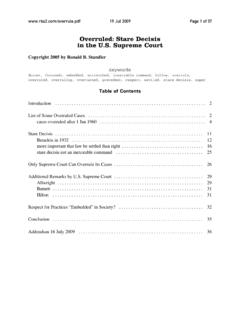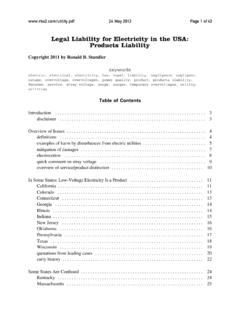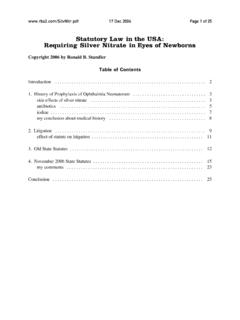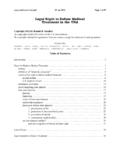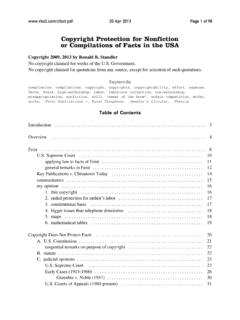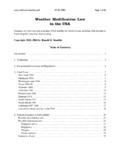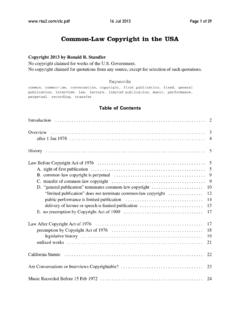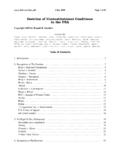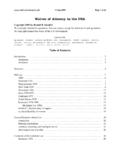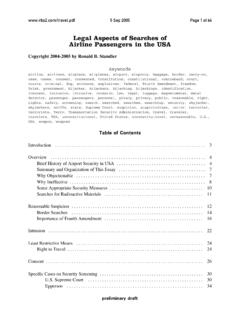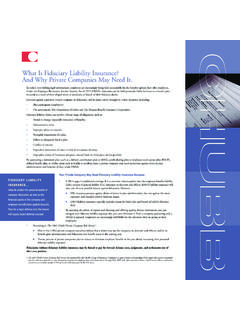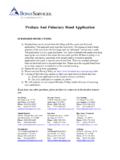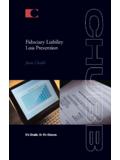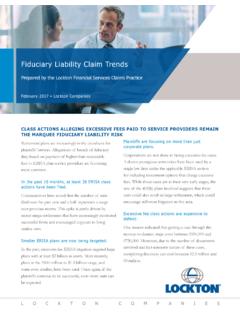Transcription of Professor-Student Is Not a Fiduciary Relationship
1 Sep 2007 Page 1 of 23 Professor-Student Is Not aFiduciary RelationshipCopyright 2007 by Ronald B. StandlerTable of ContentsIntroduction .. 2 Fiduciary Duty .. 2 Law Review Articles .. 3 Court Cases .. 4 Zumbrun .. 4 Crook .. 5 Andr .. 7 Shapiro .. 8 Frost .. 9Ho .. 10 Schneider .. 10 Johnson .. 11 Chou .. 14 VanVoorhies .. 15 Zahn .. 17 Manning .. 18 Univ. of Iowa .. 19 Physician-Patient Relationship .. 19My View .. 20evaluation of students .. 21torts .. 21Is the college a Fiduciary ?
2 22 Conclusion .. 22 Bibliography .. Sep 2007 Page 2 of 23 IntroductionIn 1999, in doing legal research on academic disputes between students and either professorsor colleges, I learned that the college nearly always wins in court, because the judge defers to thecollege in purely academic In practice, this means that a grieved student has no forumoutside of hearings and appeals at his/her college. The obvious quest is to find a legal theory thatwill permit grieved students to be heard in court. In 1981, Professor Nordin suggested acontractual theory,2 but judges have not accepted her 1999-2000, I flirted with the idea that professors had a Fiduciary duty to their students,as a possible way of holding professors accountable for abuse of their students.
3 In May 2007,after I finished my essay on academic abstention, I read several law review articles3 that suggestedthat professors have a Fiduciary duty to their students. This essay considers whether professorshave a Fiduciary duty to their students and concludes that the Professor-Student Relationship is not afiduciary essay presents general information about an interesting topic in law, but is not legaladvice for your specific problem. See my disclaimer at .I list the cases in chronological order in this essay, so the reader can easily follow the historicaldevelopment of a national phenomenon.
4 If I were writing a legal brief, then I would use theconventional citation order given in the Bluebook. Fiduciary DutyA Fiduciary is a person who is trusted to use the utmost good faith and fairness in dealing withthe person who hires the Fiduciary . In particular, a Fiduciary is not permitted to take selfishadvantage of the Fiduciary Relationship . Common examples of Fiduciary relationships include: attorney - client physician - patient4 agent - principal1 Ronald B. Standler, Academic Abstention in the USA, (June 2007).2 Virginia Davis Nordin, The Contract to Educate, 8 J. COLLEGE & UNIVERSITY LAW 141(1981).
5 3 See Bibliography, below, at page See below, at page Sep 2007 Page 3 of 23 employee - employer5 parent - child; guardian - ward; and any other in loco parentis Relationship trustee - beneficiary of trust clergy - parishioner among partners in a partnershipIn many of these Fiduciary relationships, the Fiduciary has some specialized knowledge or skillthat is used solely for the benefit of the person who hired the Fiduciary . For example, an attorneyrepresents a client, and applies the attorney s knowledge of law for the benefit of the client. For example, a guardian or parent presumedly has more knowledge and experience than a child, sothat the guardian or parent can be trusted to make decisions in the best interest of the child.
6 And,for example, a trustee not only knows how to safely invest money, but also how to avoiddisbursing it wastefully or Fiduciary Relationship differs from the usual arm s length relationships in businesstransactions, because a Fiduciary has a legal obligation of loyalty solely to the beneficiary of thefiduciary Relationship . The beneficiary of a Fiduciary Relationship can appropriately trust or canappropriately have confidence in the Fiduciary to do what is best for the beneficiary, unlike theskepticism and mutual distrust of a common business Relationship . Law Review ArticlesIn a short article published in the Harvard Law Review in 1957, Professor Seavey complainedabout the lack of due process protections given to students who were expelled from college.
7 In passing, Prof. Seavey noted that professors had a Fiduciary Relationship to students:These same professors .. are in fact fiduciaries for their students and should be the first toafford to their students every protection. [FN3][FN3] A Fiduciary is one whose function is to act for the benefit of another as to mattersrelevant to the relation between them. Since schools exist primarily for the education oftheir students, it is obvious that professors and administrators act in a Fiduciary capacitywith reference to students. One of the duties of the Fiduciary is to make a full disclosureof all relevant facts in any transaction between them.
8 See RESTATEMENT, AGENCY 390(1933); RESTATEMENT, TRUSTS 170 (1935). The dismissal of a student comes withinthis A. Seavey, Dismissal of Students: Due Process , 70 HARVARD LAW REVIEW 1406,1407 (June 1957).Although it was obvious to Prof. Seavey that professors were fiduciaries, judges asexplained below have rarely accepted that legal characterization of the professor-studentrelationship as a Fiduciary Relationship . Prof. Seavey was an expert on agency, restitution, andjudgments, and a professor at Harvard Law School. He was not an expert on education law, he5 Snepp v. , 444 507, 518 (1980) (.)
9 The employee possesses Fiduciary obligationsarising out of his duty of loyalty to his employer. ); Restatement Second of Agency 1 (1958). Sep 2007 Page 4 of 23apparently expected conventional law to be consistently applied to schools and colleges. I thinkProf. Seavey was angrily responding to harsh treatment of black students who engaged in civildisobedience during the early days of the civil rights law review articles are cited below, at page 22. Court CasesAs mentioned in my essay on Academic Abstention, judges do not apply conventional contractlaw or conventional tort law in student v.
10 College cases, thus ensuring that the college always wins,regardless of the facts of the dispute. Therefore, I have no confidence that judges would recognizethe existence of a professor s Fiduciary duty to a student, even if such a Fiduciary Relationship following cases are among the few reported cases that discuss the possible Fiduciary dutyof a professor. Given that there are many hundreds of reported cases involving student , these few cases indicate that judges rarely consider a possible Fiduciary duty byprofessors. ZumbrunA student, Jean Zumbrun, sued the University of Southern California for a refund of $ 518tuition, and other damages, when the professor who taught Sociology 200 canceled the remainingclass meetings after 1 May 1970 and canceled the final exam that was scheduled on or before2 June 1970.
